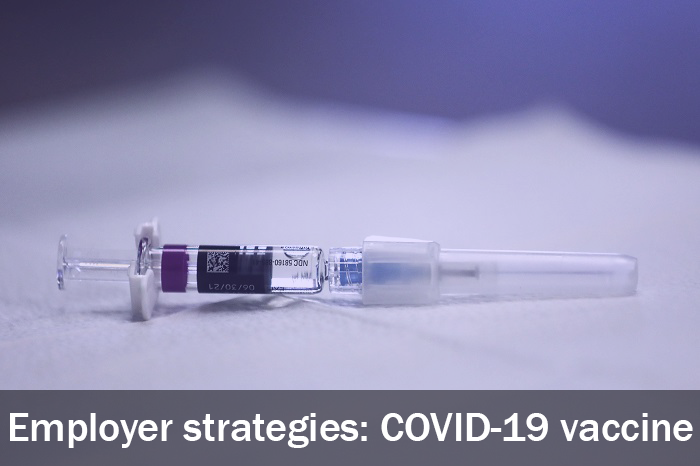Most employers don’t intend to require COVID-19 vaccination among their employees and plan instead to encourage inoculation through education, incentives and more.
That finding comes from two new surveys that gauge employers’ COVID-19 vaccination plans. Less than 1% of respondents currently mandate vaccination for all employees, and just 6% say they plan to do so once vaccines are readily available and/or the U.S. Food and Drug Administration grants full approval, according to a survey of 1,800 human resources professionals, in-house lawyers and C-suite executives from employment and labor law firm Littler. Similarly, a survey of 700 employers from law firm Fisher Phillips finds that 64% of employers are not considering mandating the vaccine, 27% are unsure and 9% are considering mandating their employees take the vaccine.
Register for HRE’s Health and Benefits Leadership Conference here.
“Given the wide range of legal and practical considerations employers must balance in establishing COVID-19 vaccination policies, it’s not surprising that most are currently planning to encourage, rather than mandate, immunization,” says Barry Hartstein, leader of Littler’s COVID-19 vaccination working group. “It’s also a telling sign of the unprecedented environment we’re operating in that employers’ top two concerns with requiring vaccination are not legal or liability issues, but rather focus on the personal perspective of employees grappling with an ongoing global crisis and the potential impact on company culture.”
The Equal Employment Opportunity Commission recently said employers can require employees to get immunized with the coronavirus vaccine, with some accommodation exceptions. But despite the allowance, experts predict that the majority of employers will tread carefully on mandating vaccines. Others speculate companies will first encourage the shots before requiring them, in hopes of getting workers to buy in, or wait to see which of their peers mandate inoculation.
Both surveys, though, point to widespread encouragement. Fisher Phillips found that the overwhelming majority of employers (78%) are encouraging their employees to take the vaccine and many of them are still weighing their options on offering incentives to employees.
Meanwhile, Littler’s survey finds that nearly 90% of respondents say they would provide information to employees–such as the benefits of vaccination and how to get vaccinated–and 37% said they would offer vaccine administration at their own facility to increase convenience. Employers highlighted other avenues of encouragement, such as offering paid time off to receive the vaccine or recover from its side effects (3%) and providing incentives to employees, such as cash awards or other monetary benefits (11%).
Related: Mayer: Don’t have a vaccine strategy? It’s time to make one
A handful of employers have announced plans to encourage vaccinations among employees in the last month. Kroger announced it will pay a $100 bonus to any of its employees who get vaccinated against COVID-19. Grocers Aldi and Trader Joe’s both say they will provide employees with two hours of pay for each dose they receive, up to four hours total, as well as scheduling flexibility for salaried employees.
Dollar General was one of the first major employers to announce a strategy for encouraging its workers to get vaccinated against COVID-19. The retailer said last month that it’s offering workers an extra four hours of pay for getting the vaccine.
Experts say employers play a major role in encouraging people to get vaccinated against COVID-19 to help drive up immunity and get society back to normal. “If we really are in this together, then the workplace is a perfect place to think about how we can get this vaccine into the hands, or arms, of all of our employees and everyone in the U.S.,” Ali Payne, an organizational consultant at brokerage firm Holmes Murphy, said during a webinar last month.
Related: Employers can legally require COVID vaccines–but will they?



